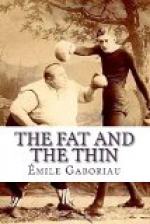Florent and Claude had now to pause at every step. The fish was arriving and one after another the drays of the railway companies drove up laden with wooden cages full of the hampers and baskets that had come by train from the sea coast. And to get out of the way of the fish drays, which became more and more numerous and disquieting, the artist and Florent rushed amongst the wheels of the drays laden with butter and eggs and cheese, huge yellow vehicles bearing coloured lanterns, and drawn by four horses. The market porters carried the cases of eggs, and baskets of cheese and butter, into the auction pavilion, where clerks were making entries in note books by the light of the gas.
Claude was quite charmed with all this uproar, and forgot everything to gaze at some effect of light, some group of blouses, or the picturesque unloading of a cart. At last they extricated themselves from the crowd, and as they continued on their way along the main artery they presently found themselves amidst an exquisite perfume which seemed to be following them. They were in the cut-flower market. All over the footways, to the right and left, women were seated in front of large rectangular baskets full of bunches of roses, violets, dahlias, and marguerites. At times the clumps darkened and looked like splotches of blood, at others they brightened into silvery greys of the softest tones. A lighted candle, standing near one basket, set amidst the general blackness quite a melody of colour—the bright variegations of marguerites, the blood-red crimson of dahlias, the bluey purple of violets, and the warm flesh tints of roses. And nothing could have been sweeter or more suggestive of springtide than this soft breath of perfume encountered on the footway, on emerging from the sharp odours of the fish market and the pestilential smell of the butter and the cheese.
Claude and Florent turned round and strolled about, loitering among the flowers. They halted with some curiosity before several women who were selling bunches of fern and bundles of vine-leaves, neatly tied up in packets of five and twenty. Then they turned down another covered alley, which was almost deserted, and where their footsteps echoed as though they had been walking through a church. Here they found a little cart, scarcely larger than a wheelbarrow, to which was harnessed a diminutive donkey, who, no doubt, felt bored, for at sight of them he began braying with such prolonged and sonorous force that the vast roofing of the markets fairly trembled. Then the horses began to neigh in reply, there was a sound of pawing and tramping, a distant uproar, which swelled, rolled along, then died away.
Meantime, in the Rue Berger in front of them, Claude and Florent perceived a number of bare, frontless, salesmen’s shops, where, by the light of flaring gas jets, they could distinguish piles of hampers and fruit, enclosed by three dirty walls which were covered with addition sums in pencil. And the two wanderers were still standing there, contemplating this scene, when they noticed a well-dressed woman huddled up in a cab which looked quite lost and forlorn in the block of carts as it stealthily made its way onwards.




